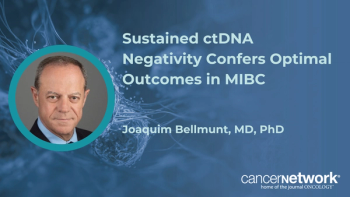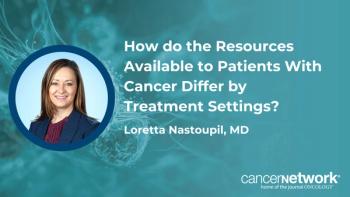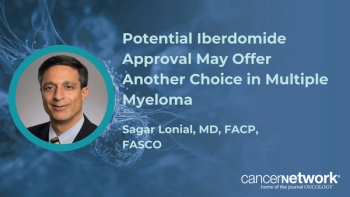
Evaluating Reflexology Impact on Breast Cancer RT-Related Anxiety, Pain
Patients undergoing radiotherapy for breast cancer were offered 15-minute nurse-led reflexology sessions to increase energy and reduce stress and pain.
CancerNetwork® spoke with Heather Zinkin, MD, chief of radiation medicine at Huntington Hospital of the Northwell Health Cancer Institute, about how reflexology was utilized in patients with breast cancer undergoing radiation therapy and how the efficacy of the intervention was assessed. She discussed this methodology in the context of a study she presented at the
Zinkin began by highlighting the inclusion of a holistic nurse for a full workday every week, which was funded by the Northwell Center for Wellness and Integrative Medicine. She further explained that patients were offered a complimentary 15-minute session with the nurse for up to 5 weeks in a converted exam room which served as a quiet, meditative space.
Zinkin further outlined the process, whereby patients chose which portion of the body they wanted to receive reflexology, which was supplemented with mindfulness. She then stated that the impact of reflexology sessions was assessed through anonymous pre- and post-intervention stress thermometer surveys, which measured patient-reported energy, anxiety, and pain.
The study assessed 560 patient encounters from April 2022 through December 2023 to evaluate the impact of reflexology on patient-reported levels of stress, pain, and energy. Findings from the study showed that stress and pain were reduced by 40.0% and 24.0%, respectively, and that energy increased by 33.3%. Additionally, improvement in patient well-being overall was reported to have increased by 33.3% (P < .0001).
Transcript:
We were fortunately able to obtain funding from Northwell Center for Wellness and Integrative Medicine for a holistic nurse from their practice to come to our office for a full workday every week. Then we were able to offer every [patient with] breast cancer who was under treatment––receiving radiation therapy––a complimentary 15-minute session with her for up to 5 weeks. We converted one of our exam rooms into a quiet, meditative space with dim lighting, flameless candles, and some soft music. Women were able to choose what part of the body they preferred, whether it be their hands, their feet, or their neck, and they were offered 15 minutes of reflexology, including some mindfulness. Each patient was asked anonymously to complete a stress thermometer survey prior to and after each session so that we could evaluate the response to each therapy. We looked at various metrics, including energy, anxiety, and pain.
Reference
Zinkin HD, Kostroff K, Dimisa D, et al. Reflexology as an integrative approach to improve stress, energy, and pain in women receiving radiotherapy for breast cancer. Int J Radiat Oncol. 2024;120(suppl 2):e423. doi:10.1016/j.ijrobp.2024.07.944
Newsletter
Stay up to date on recent advances in the multidisciplinary approach to cancer.



















































